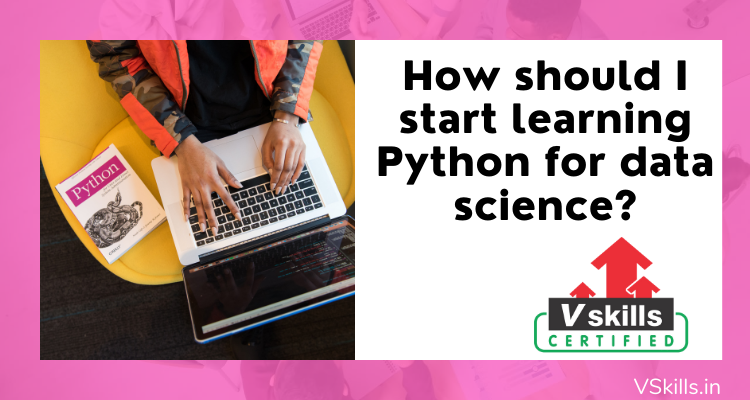Over the years, Computer languages related career have made their place in the list of most trending career. Python of the multi-paradigm and high-level languages that is used by programmers due to its conventional and better features than other languages as Java, C++ and many others. In addition to this, its object-oriented feature has made it even more convenient and accurate to deal with. It has been in headlines now-a-days that python is a key to the future of data science. Python for Data Science has emerged as the tools and frameworks that data scientists use everyday.
Its importance to data science, itself a rapidly burgeoning field, makes Python worth studying. But it might be confusing how and from where to start. Here, you will know about some sources from where you can start learning and analysis of some other factors such as market demand, average salary, skills required and so on which will make the field look a little less volatile to you. Let us look at the details which will help you to set a firm foot into this field. Firstly, let us look at what is Python?
Let us begin with the analysis of this field!
What is python?
Python is an interpreted, high-level and general-purpose programming language. Python’s design philosophy emphasizes code readability with its notable use of significant indentation. It is used in web development, data science, creating software prototypes and many more. In fact for beginners, Python has simple easy-to-use syntax. This makes Python an excellent language to learn to program for beginners.
Target Audience – IT specialists aspiring to learn a new skill set; statisticians; computer scientists; and IT analysts etc. learns python language. However, the language is not limited to any specific set of people or a specific field.
Let us now look at the typical jobs you can get after learning python language.
Areas one can discover after learning Python
Python presents a number of clear paths to finding meaningful work. While some of those potential jobs may seem obvious — like becoming a Python developer — other careers where knowing Python is an asset are more unexpected.
1. Python Developer
Becoming a Python developer is the most direct job out there for someone who knows the Python programming language.
A Python developer can be expected to:
- firstly, Build websites
- also, Optimize data algorithms
- furthermore, Solve data analytics problems
- subsequently, Implementing security and data protection
- also, Writing reusable, testable and efficient code
2. Product Manager
Product managers are responsible for researching new user features, find gaps in the market, and make an argument for why certain products should be built. Data plays a huge role in their work, so many companies are now seeking product managers who know Python.
3. Data Analyst
Does the idea of finding meaning in large amounts of information appeal to you? Many companies are searching for someone who can sift through large sets of data — and a popular way to meet the demands that is using Python libraries such as SciPy and Pandas.
4. Educator
Someone has to teach Python too. And not everyone learns through in short span of time. Becoming a computer science instructor may be the first thing that comes to mind, but it’s not the only teaching role available to those who know Python. Nearly every university and coding boot camps, as well as online coding tutoring platforms like CodeMentor, are in need of people to teach Python!
5. Financial Advisors
In 2018, Citigroup began training their bank analysts to learn Python. The hope is that having the chops to program computer code will cut costs, and increase the bank’s revenue. Business schools around the country have responded by teaching Python to their MBA students.
6. Data Journalist
Data journalism is a specialty within journalism that uses data to tell stories. Journalist who know Python are in huge demand because of their ability to rapidly sorting and arranging through information. If you’re a solid writer to boot, this might be just the role for you.
There are yet many roles which could be discovered once you are in terms with this trending language. But, majority of the roles we listed are less related to the computer programming field and more into the field of data analysis. Hence, we can see that it is need of the hour to learn about the python in data science. Data science is an inter-disciplinary field that uses scientific methods, processes, algorithms and systems to extract knowledge and insights from structured and unstructured data, and apply knowledge and actionable insights from data across a broad range of application domains.
Now that we know how important it is to know about python in data science, Let us look at the ways through which you can start learning about this.
Let us now look at the market demand and average salary for the professionals working in this field –
Market demand and average salary
Data Science with Python is one of the faster growing filed and are in great demand. Companies like KPMG, Accenture, TCS & Cognizant specializing in Data Science related activities are constantly looking for certified professionals.
The average data scientists salary is ₹698,413. An entry-level data scientist can earn around ₹500,000 per annum with less than one year of experience. Early level data scientists with 1 to 4 years experience get around ₹610,811 per annum.
A mid-level data scientist with 5 to 9 years experience earns ₹1,004,082 per annum in India. As your experience and skills grow, your earnings rise dramatically as senior-level data scientists around more than ₹1,700,000 a year in India!
How should I start learning Python for data science?
The experts at IBM predicted a 28% increase in demand for data scientists by the year 2020. Data science experts are speculating this trend to continue with increasing development in the Python ecosystem. And while your journey to learn Python programming may be just beginning, it’s bit satisfying to know that employment opportunities are too much and will continue to grow as well.
Here are some steps that you can follow if you are beginner in learning about python in data science!
Step 1 – Start by learning Fundamentals
Before becoming an expert in some field, it is very much essential that you have a strong base. A proper conceptual knowledge is required even before you get your hands on to the practical labs. Everyone starts somewhere. You need to take baby steps if you want to build a successful career in this field. Firstly, begin your journey by learn completely about python. And then, you can learn about how and why python is used in data sciences. There are many resources which you can use for starting your journey such as taking the certification courses by various sites such as Vskills, Coursera, Udemy and so many others too. A certification course by Vskills is described in subsequent paragraphs which is a reliable source and can help you gain best knowledge.
You can also take the help of online community where you can find like minded people which will offer you guidance and can also tell you about the other resources. Furthermore, you can also take the help of Jupyter Notebook, which comes prepackaged with Python libraries to help you learn these two things. You will find some resources in the subsequent paragraphs offered by Vskills.
Step 2 – Practice Mini Python projects side by side
Practicing is, essentially, a very much important part of the learning process. When it comes to the practical aspects like implementing python in projects, having some experience can help you outshine others. Try programming things like calculators for an online game, or a program that fetches the weather from Google in your city. Building mini projects like these will help you learn Python. programming projects like these are standard for all languages, and a great way to solidify your understanding of the basics.
You can supplement your learning with the help of reading the blogs and tutorials by various sites which will help you to grasp a better understanding of the practical aspect.
Step 3 – Refer Data Science libraries for Python
Now that, if you followed the above two steps carefully, you developed a complete understanding of python as a language. Let us now take another step of learning the data sciences with python. In Python, there is generally a best way of doing something. The three best and most important Python libraries for data science are NumPy, Pandas, and Matplotlib. NumPy and Pandas are great for exploring and playing with data. Matplotlib is a data visualization library that makes graphs like you’d find in Excel or Google Sheets.
There are many python developers which are eager to guide and solve your doubts in this process. Again, you can refer to the online community of these developers of can find them over web. Remember that, the more deep you will study and the more practice you will do, the better would be career opportunities for you.
Step 4 – Build Your Portfolio
It is essential for a data science to have a portfolio. Your portfolio shows your skills to implement and design different codes or how perfectly you implement your skills in data sciences. These projects should include several different datasets and should leave readers with interesting insights that you’ve gleaned. Your portfolio doesn’t need a particular theme; find datasets that interest you, then come up with a way to put them together.
One of the nice things about data science is that your portfolio doubles as a resume while highlighting the skills you’ve learned, like Python programming. So, it is good to collaborate, communicate and focus on various technical competencies.
Step 5 – Implement your skills
After learning, it is very much essential to implement your skills some where in order to test yourself and know your competency. You can go for internships or freelancing in order to test your skills. It is also important to keep updating yourself with new technological advancements and keep working and developing on your own skills. You can also enroll in some of the advance learning courses which will also serve as proof that you are well aware of advanced skills. After learning, you’ll want to be comfortable with regression, classification, and k-means clustering models. You can also step into machine learning — bootstrapping models and creating neural networks using scikit-learn.
So, these were some steps that you can follow if you want to start learning about the python in data sciences. Let us now move on to some resources provided by Vskills such as online certification, Tutorials and free practice test which will aid in the journey of learning.
Certified Data Science with Python Professional
This Course is intended for Individuals wanting to understand a deeper level of data science using more advanced techniques and operations and individuals wanting to expand their knowledge of Python while learning data science; IT specialists aspiring to learn a new skill set; statisticians; computer scientists; and IT analysts etc.
Earning Vskills Data Science with Python Certification can help candidate differentiate in today’s competitive job market, broaden their employment opportunities by displaying their advanced skills, and result in higher earning potential. Let us look at the details of this certification –
Test Details
- Duration: 60 minutes
- No. of questions: 50
- Maximum marks: 50, Passing marks: 25 (50%).
- There is NO negative marking in this module.
- Mode: Online exam.
Benefits of Certification
- Firstly, Government Certification
- Also, Certification valid for life
- Furthermore, Lifelong e-learning access
- Additionally, Free Practice Tests
- Moreover, Get tagged as ‘Vskills Certified’ On Monsterindia.com
- Furthermore, Get tagged as ‘Vskills Certified’ On
 Shine.com
Shine.com
Content Outline
In this course, you will learn the following concepts in depth –
- Introduction to Data Science
- also, Python Essentials for Data Science
- furthermore, Data Science Tool Box
- moreover, Importing & Cleaning Data
- subsequently, Data Visualization with Statistical Thinking
- additionally, Introduction to Machine Learning with Scikit-Learn
- lastly, Practice with Case Studies
Let us look at some additional resources provided by Vskills –
Online learning Tutorials
Vskills provides candidates access to prepare for the exam using the online learning tutorials or material for a lifetime. The online material for this is regularly updated. Moreover, the e-learning that is provided comes with hard copy material for helping candidates to improve and update the learning curve for getting better opportunities.
Free practice tests
Vskills provide you free test papers and paid test series which will keep evaluating your preparation. Taking the test series will help you identify what parts of the syllabus are strong from your side and on which parts you are required to put more efforts. Since, clearing the exam is not the end, you have to apply the concepts practically to secure your dream job. Take a free practice test now!
Hence, Python in Data sciences have emerged as trending skill which is demanded by most of the sectors and MNCs across the globe. So, Upgrade your career opportunities by learning Python for data science. Hurry up and try free practice test now!






